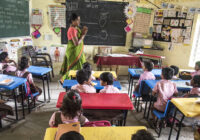Every year, on Indian Science Day in February, India commemorates the discovery of the Raman Effect by Sir C.V. Raman. In 1930, Raman won the Nobel Prize in Physics and has been revered by Indians ever since.
Fast forward to 2019, and the US National Science Foundation placed India third when it came to publishing science and engineering articles. Despite this, the country came 52nd in the Global Innovation Index. Reaching such a low rank is an alarming sign for science education in the country.
Problems in Science Education
In India, there are two forms of schools: state-run and private. Despite separate school systems, the curriculum is decided by either the state or central governments. While science and mathematics have seen improvement over the years, they lack enough practical work.
This may be a common problem at schools worldwide — irrespective of public or private models — but it is particularly prominent at state-run schools in India. Most of these institutions are not equipped with well-managed practical science labs. There is also a shortage of science and mathematics teachers. Both state and central governments are trying hard to resolve this problem by implementing new measures. These have included the recruitment of additional teachers, guest faculty members and education fellows, but none of these have been sufficient.
The recruitment of temporary teachers often means they do not take much interest in developing teaching aids for subjects like physics or mathematics as they are only at a school for a short period of time. The appointment of dedicated employees such as education fellows for up to five years could help solve this problem.
These fellows would essentially be employed as innovation experts who are responsible for developing innovative learning aids in local languages around India. These education fellows could go on to become permanent teachers if they do their job well. At the same time, making these developed teaching aids available to other partners, such as private schools or book publishers, would help distribute the resources to a wider market.
The science curriculum should be revised regularly and kept up to date with the demands of the modern-day market, but it should also be tailored for the individual learner. It is well-known that the majority of Indians live in small villages and, therefore, science education should be village-centric. Examples from daily village life illustrating scientific principles would enable far-more effective learning than those from urban or foreign settings. Yet most science textbooks are not catered to village students, which leaves many confused with the concepts and thus affects their education.
Science books should focus more on the practical application of science laws. While explaining the laws, students must know about the practical relevance of that scientific principle. On the one hand, students should be made aware of the necessity and relevance of differential equations for automobiles, steel and power industries. On the other hand, the pure scientific application in space science and technology should also be highlighted. Such an approach would make a student develop a deeper understanding of subjects. Yet the majority of the current curriculum is outdated and lacks innovation.
Government Initiatives
Some schemes by the central government have sought to address this. The Atal Innovation Mission was introduced in 2015-16 to promote innovation and entrepreneurship culture among Indians. Likewise, the Atal Tinkering Lab was launched to help students understand the importance of STEM — science, technology, engineering and mathematics — subjects. This scheme provides significant monetary support of up to 1 million rupees ($13,300) to selected public and private schools.
Various forms of modern technology have been purchased by educational institutions, including drones and electronic sensors. Yet students are often only taught to assemble items that already exist by following a supplier’s instructions. Instead, they should be testing their skills by developing new, innovative models of the same concepts.
Teachers are expected to use equipment purchased under the scheme of Atal Tinkering Lab to bring out a student’s hidden ideas. For example, a drone can be used as an educational tool for such things as teaching engineering design by explaining aerodynamic models, materials selection with how to make drones lightweight, electronic circuit design and also battery selection.
Students have to be taught the importance of scientific collaboration. India needs to focus on scientific modeling in which students apply principles and learn to work together in teams. In sum, the real purpose of the Atal Lab program will only be achieved when schools adopt innovative teaching practices and make students think outside the box.
Other initiatives, such as the National Children Science Congress, the Inspire Awards and the National Science Seminar, are being organized by the central government with the support of each state. While India is taking steps in the right direction, it is high time to redevelop science education.
If India can find innovative ways in shaking up its science curriculum and the way it is taught, future generations of Indians are more likely to pursue higher education in science. In turn, India would flourish when it comes to scientific research.
The views expressed in this article are the author’s own and do not necessarily reflect Fair Observer’s editorial policy.
Support Fair Observer
We rely on your support for our independence, diversity and quality.
For more than 10 years, Fair Observer has been free, fair and independent. No billionaire owns us, no advertisers control us. We are a reader-supported nonprofit. Unlike many other publications, we keep our content free for readers regardless of where they live or whether they can afford to pay. We have no paywalls and no ads.
In the post-truth era of fake news, echo chambers and filter bubbles, we publish a plurality of perspectives from around the world. Anyone can publish with us, but everyone goes through a rigorous editorial process. So, you get fact-checked, well-reasoned content instead of noise.
We publish 2,500+ voices from 90+ countries. We also conduct education and training programs
on subjects ranging from digital media and journalism to writing and critical thinking. This
doesn’t come cheap. Servers, editors, trainers and web developers cost
money.
Please consider supporting us on a regular basis as a recurring donor or a
sustaining member.
Will you support FO’s journalism?
We rely on your support for our independence, diversity and quality.






